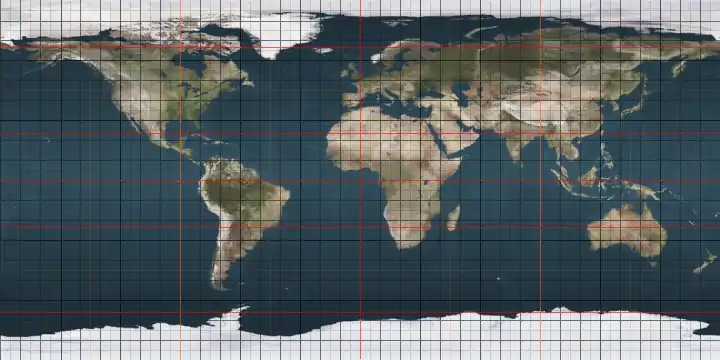36th parallel north
The 36th parallel north is a circle of latitude that is 36 degrees north of the Earth's equatorial plane. It crosses Africa, the Mediterranean Sea, Asia, the Pacific Ocean, North America and the Atlantic Ocean. In the ancient Mediterranean world, its role for navigation and geography was similar to that played by the Equator today.[1]
.svg.png.webp)
From 7 April 1991 to 31 December 1996, the parallel defined the limit of the northern no-fly zone in Iraq.[2]
At this latitude the sun is visible for 14 hours, 36 minutes during the summer solstice and 9 hours, 43 minutes during the winter solstice.[3]
Around the world
Starting at the Prime Meridian and heading eastwards, the parallel 36° north passes through:
United States
In the United States, the 36th parallel north is occasionally used as a rough northern boundary for the Sun Belt, a region spanning most Southern and Southwestern states and comprising most of the nation's warmest climates.
Cities and landmarks close to the parallel include the following: Kettleman City, California; Henderson, Nevada; Hoover Dam; South Rim of the Grand Canyon; Los Alamos National Laboratory; Tulsa, Oklahoma (passing through the southern portion of the city); Nashville, Tennessee (passing through the southern portion of the city); Knoxville, Tennessee; Winston-Salem, North Carolina; High Point, North Carolina; Greensboro, North Carolina; Durham, North Carolina; Chapel Hill, North Carolina; and others. The parallel helped define the North Carolina–Tennessee–Virginia Corners.
The sixth standard parallel south of Mount Diablo Range at 35°48′ north, 13.8344 miles south of the 36th parallel, forms a continuous boundary between the California counties of Monterey, Kings, Tulare, and Inyo on the north and the counties of San Luis Obispo, Kern, and San Bernardino on the south.[4] It is sometimes taken as the boundary between Central California and Southern California.[5]
The parallel 36° north approximately forms the southernmost boundary of the Missouri Bootheel with the State of Arkansas.
The 36th parallel passes through Duke University in several places. Its Campus Drive that connects the campuses crosses the parallel several times. The Duke Gardens has a "36th Parallel Club" although the garden itself is just north of the parallel.
References
- FEDERACION DE TROPAS Y LEGIONES (5 September 2012). "Revista Oficial Carthagineses y Romanos 2012". Cite journal requires
|journal=(help) - "Containment: The Iraqi no-fly zones". BBC News. 29 December 1998. Retrieved 4 February 2012.
- "Duration of Daylight/Darkness Table for One Year". aa.usno.navy.mil. Retrieved 10 April 2016.
- California (1 January 1886). The Codes and Statutes of California, as Amended and in Force at the Close of the Twenty-sixth Session of the Legislature, 1885: With Notes Containing References to All the Decisions of the Supreme Court Construing Or Illustrating the Sections of the Codes, and to Adjudications of the Courts of Other States Having Like Code Provisions. A. L. Bancroft.
- California, Historical Society of Southern; California, Los Angeles County Pioneers of Southern (1 January 1901). The Quarterly.
